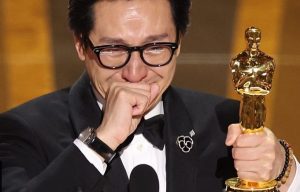Refugee’s journey capped off with an Oscar
“My journey started on a boat. I spent a year in a refugee camp and somehow I ended up here on Hollywood’s biggest stage.”
 These were words used by former refugee Ke Huy Quan in his Oscar acceptance speech on winning the Best Supporting Actor award for his powerful performance in the seven Oscar-winning film ‘Everything Everywhere All At Once’.
These were words used by former refugee Ke Huy Quan in his Oscar acceptance speech on winning the Best Supporting Actor award for his powerful performance in the seven Oscar-winning film ‘Everything Everywhere All At Once’.
“They say stories like this only happens in the movies. I cannot believe it’s happening to me. This, this is the American dream,” he said.
“Thank you! My mum is 84 years old and she’s at home watching. Mum! I just won an Oscar,” Quan said.
“Dreams are something you have to believe in. I almost gave up on mine. To all of you out there, please keep your dreams alive. Thank you! Thank you for so much for welcoming me back!”
Quan was discovered was a child actor by Steven Spielberg who cast him as Short Round opposite Harrison Ford in Indiana Jones and the Temple of Doom.
Ford presented Quan with his Oscar in emotional scenes.
When he won at the Golden Globes in January, he even thanked Spielberg who was in the audience. He said, “I am so happy to see Steven Spielberg here tonight. Steven, thank you.”
The year after Indiana Jones, he starred in The Goonies. After a couple more roles in the early 1990s – Breathing Fire and Encino Man with Brendan Fraser – Quan found the roles dried up.
“Stepping away from acting was not an easy decision to make. I had to be realistic, there were not a lot of opportunities for an Asian actor at that time. I had no choice but to do something else, so I went to film school, graduated, and started working behind the camera,” he said in post Oscar’s interview.
After a 20-year break, Quan decided to have another go at his dream, and within two weeks he read the script for Everything Everywhere All At Once.
The film was nominated for 11 Oscars and won seven.
“And I got the part! So for all those doubters out there who don’t think their dream can come true, look at me. Your dream can come true as well.”
Quan talked about the challenges he faced as an actor of Asian heritage in an industry where the opportunities were few and far between.
“For so many years, I was afraid I had nothing more to offer. No matter what I did I would never surpass what I achieved as a kid,” he said.
Quan was born in 1971, in Saigon, South Vietnam. He was born into a family of Chinese descent with eight siblings.
In 1975, North Vietnam captured the South and unified the country; three years later, Quan fled Vietnam with his family.
He, along with his father and five siblings, fled to Hong Kong, while Quan’s mother and three other siblings went to Malaysia.
After living in a refugee camp in Hong Kong, Quan’s entire family was admitted to the US as part of the Refugee Admissions Program in 1979.
Quan grew up in California and studied at the University of Southern California’s School of Cinematic Arts.
After the fall of Vietnam in April 1975, the US faced the challenge of resettling hundreds of thousands of displaced Indochinese refugees.
They established an Indochinese refugee task force to respond to this crisis and deal with the ongoing resettlement of refugees.
Ultimately the US Congress passed the Refugee Act of 1980. Since 1975, over three million refugees have been resettled in the US, with annual admissions figures ranging from a high of 207,000 in 1980 to a low of 11,411 in 2021.
The average number admitted annually since 1980 is 75,030.












